South America travel can be exciting and full of stories. You can travel through different countries such as Peru, Chile, and Argentina seeing breathtaking views, visiting must-see landmarks, and tasting various types of food and flavors. Whether you plan to travel by air or road, this ultimate South America travel guide will be your best ally.
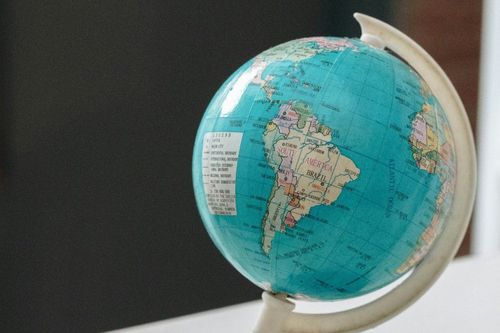
Ultimate Peru Travel Guide: Uncover the Wonders of the Andes
Peru offers many tourist attractions beyond the traditional Machu Picchu or Lake Titicaca. The ultimate South America travel guide lists some of them.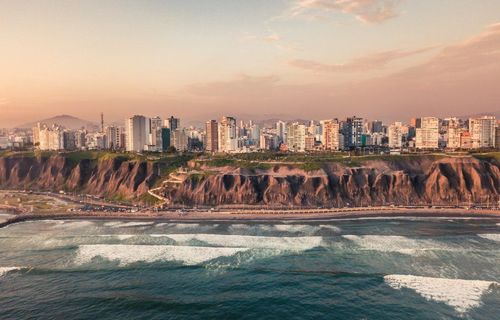
Discover Lima
Top Attractions in Peru’s Capital
Lima or “the City of Kings” offers a fusion of history, culture, and gastronomy. Some places you must visit are the historic center of Lima and its stunning colonial architecture that transports you back in time, or Plaza Mayor, which houses iconic structures like the Government Palace and Cathedral Basilica of St. John the Apostle.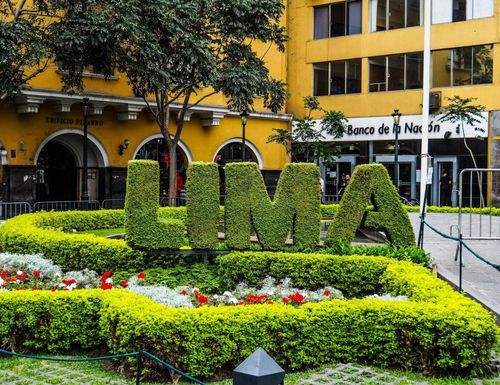
Best Food Spots in Lima
Lima is often called the culinary capital of South America, This prestigious reputation stems from its innovative chefs, diverse ingredients, and a fusion of cultural influences, which have placed it on the global gastronomic map. Lima’s cuisine uniquely blends traditional Peruvian cooking practices and ingredients, influenced by Spanish, African, Chinese, Japanese, and Italian migrations.
Cusco and the Sacred Valley
Exploring the Heart of the Inca Empire
Nestled high in the Andes, Cusco offers a gateway to the wonders of the Inca civilization, with stunning archaeological sites like Sacsayhuamán and Qorikancha. Also, there are other places such as Cusco Main Square Plaza de Armas, and Cusco Cathedral. This square is a kaleidoscope of culture, where historic cathedrals stand in conversation with the lively buzz of contemporary restaurants and bars.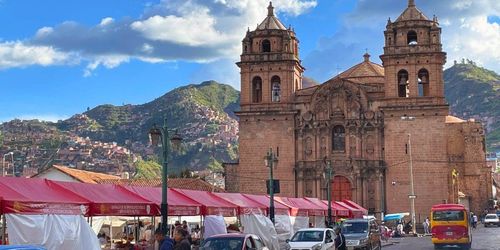
Must-See Sites in the Sacred Valley
Nestled between Cusco and Machu Picchu, the Sacred Valley served as the agricultural and spiritual heart of the Inca Empire. A journey through the Sacred Valley is a journey through time. Each village and archaeological site tells a story of the Inca Empire’s ingenuity and reverence for nature. Pisac, with its impressive terraces and vibrant market, introduces visitors to the agricultural prowess and artisan skills of the Incas. Also, the town of Ollantaytambo, a living museum of Inca architecture, has massive stone structures and a well-preserved fortress that showcases the strategic and engineering brilliance of the Inca people.See more about other top attractions in Cusco
Machu Picchu Adventure
Planning Your Visit to the Lost City
Machu Picchu is an ancient Inca city located at 2490 meters, commonly known as “The Lost City of the Incas”. It is one of the most famous and amazing wonders of the New World and a must-see destination when traveling to Peru. You can get there by the Inca Trail, by train, or by walking along the train tracks.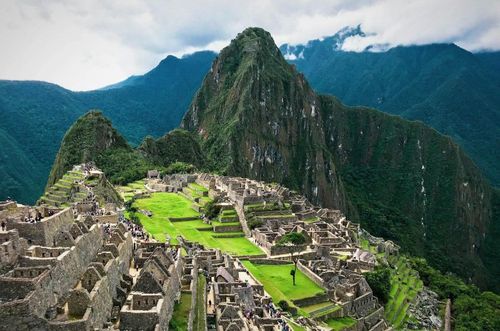
Hiking the Inca Trail: What You Need to Know
The Inca Trail is not the only way to get to Machu Picchu, but it is the most incredible and surprising. This tourist route can only be accessed through authorized travel agencies. There are trekkings of two and four days and it is essential to have an excellent physical condition. The walk ends in "one of the entrances to Machu Picchu" (Intipunku), which is why many believe it is the way to get there. Only a few visitors can access it, so reservations must be made beforehand.See more about The Inca Trail here.
Natural Wonders and Outdoor Activities
Hiking Rainbow Mountain
Rainbow Mountain is a unique mountain formation in the Andes of Peru that features the different colors of the rainbow. The unique appearance is due to volcanic activity in the region which creates individual layers rich in specific minerals based on periods. This is a must-do activity in your South America travel for all those who love stunning landscapes and gorgeous sceneries.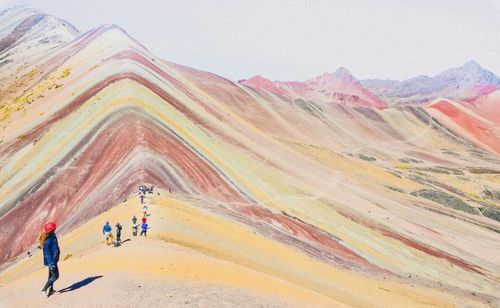
Exploring the Amazon Rainforest
The Amazon is a vast ecosystem and home to the world’s largest rainforest. As the River Amazon occupies around 40% of South America, it passes different cities that act as gateways to explore this ecosystem. In Peru, the two main gateways are Puerto Maldonado and Iquitos. The first offers great access to the remarkable Tambopta National Reserve and the second to the Pacaya Samiria National Reserve.
Cultural Experiences
Local Traditions and Festivals in Peru
We`ve taken the liberty to list in this ultimate South America travel guide some Peruvian festivals:| January | Trujillo Marinera Festival |
| February | Feast of the Candelaria |
| March | Internacional Grape Harvest Festival |
| April | Festivity of the Lord of the Tremors of Cuzco |
| May | Festival of the Crosses |
| June | Inti Raymi, the ancient Inca Festival of the Sun |
| July | Feast of the Virgen del Carmen |
| August | Saint Rose of Lima Day |
| September | Mistura Culinary Festival |
| October | Procession of the Lord of the Miracles |
| November | Puno Week |
| December | Santuranticuy |
Peruvian Cuisine: Dishes You Must Try
For food lovers, Peru can be paradise. Traditional Peruvian cooking was inspired by the cultures of oceans away. Get ready for an explosion of spicy flavors, because Peruvian food is all about spices and big flavors, some clean and crisp, others deep and heavy.Top 3 Peruvian dishes you must try
Ceviche is Peru’s national dish. Peruvians make this dish with only five simple ingredients: sea bass (corvina) marinated for just minutes in lime juice, onion, salt, and hot chiles (aji). Also, the garnishes can include starchy boiled corn (choclo) and creamy sweet potato (camote) to balance out the dish's texture. Dry-roasted corn kernels (concha) are sprinkled around to create a crunch.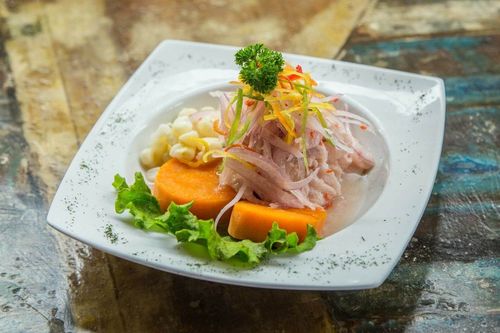
Aji de Gallina (Creamy Chicken) reflects Peru’s love of sauce thickened with chiles, cheese, cream, or even bread, often cooked with meats and vegetables. The dish consists of Shredded chicken bathed in a thick sauce made with cream, ground walnuts, cheese, and aji amarillo. The sauce is mild but piquant, and, the aji’s fruity, moderately hot bite is softened by the nutty, creamy sauce to a comfortable warmth.
Cuy (Guinea Pig) is one of the Andean region’s most popular meat sources. The traditional recipe calls for stuffing the whole animal with local herbs, then roasting it over an open wood fire and serving it with potatoes. When served this way it tastes best with a dip of aji sauce and eaten by hand like fried chicken
Learn more about Peruvian dishes you must try.
Practical Travel Tips
Best Time to Visit Peru
The best time to visit Peru is during the dry season, between May and October, which sees sunny days, bright blue skies in the Andes, and chilly nights. It is a wonderful time to be in Peru, especially if you plan to go on a trek, but being the peak season, early booking is crucial.On the other hand, visitors will notice more rain between November and April, with the wettest months being January and February. Travel at this time does offer the advantage of fewer visitors, greener scenery, and some lower rates for flights and hotels.
Essential Packing List for Peru
It’s important to pack a variety of items to ensure a comfortable and safe experience. This ultimate South America travel guide offers you a basic list of things you might need:- Travel Documents: Passport with at least six months validity, visa if required depending on your country of origin, identification cards, travel insurance, and copies of all important documents.
- Appropriate and Comfortable Clothing: Consider the climate of the regions you plan to visit. Include lightweight, breathable clothes for warmer areas and extra layers for higher altitude regions where it can get cold at night.
- Comfortable Footwear: Sturdy walking shoes, preferably hiking boots if you plan outdoor activities.
- Personal Hygiene Items: Toothbrush, toothpaste, shampoo, soap, deodorant, etc.
- Medications and Basic First Aid Kit: Bring any medications you need, pain relievers, stomach upset medications, bandages, antiseptics, etc.
- Electronics and Accessories: Chargers, power adapters, cameras, mobile phones, etc.
- Small Backpack: For carrying personal items during excursions and activities.
- Cash and Credit Cards: Make sure to have enough local currency for small purchases and credit cards for emergencies.
- Travel Guide or App: For information on destinations, activities, and local recommendations. For consulting digital maps to explore remote areas
Stay Connected in Peru with Yoho Mobile
Yoho Mobile is your best ally in South America travel. It has a wide variety of data packages that meet your needs. Also, Yoho Mobile eSIM is easy to install and intuitive to use. Share your adventures on social media and stay connected with your loved one.
🎁 Special Discount for Our Readers!As a special treat for our readers, Yoho Mobile is offering an exclusive discount! Use our coupon code "YOHOREADERSAVE" to get your first order for FREE!Don’t miss out on this opportunity to stay connected affordably while exploring Peru. |
|
Chile: A Comprehensive Travel Guide
Explore Chile's Natural Landscapes
The Atacama Desert
Chile's Atacama Desert is the world's driest desert and is at once an inhospitable rugged environment and a stunning lunar landscape. This place is ideal for adventure activities such as volcano climbing and horse riding, seeing erupting geysers, thermal pools, or colorful flamingos. The clear skies and unpolluted surroundings make stargazing in the Atacama Desert a truly magical experience, with dazzling constellations overhead.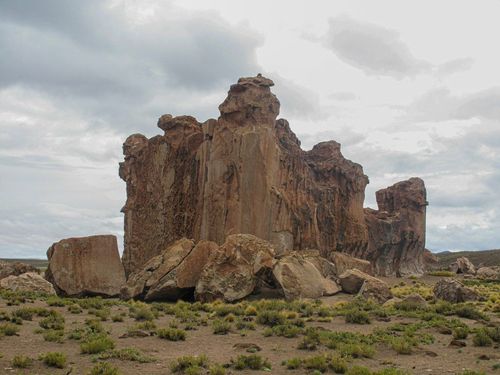
Patagonia
The vast, wide-open pampas, punctuated by dramatic granite peaks and blanketed by glaciers, is an outdoor wonderland accessible to seasoned hikers and beginners alike. Patagonia has no peer on Earth when it comes to dramatic mountain landscapes. You’ll be able to see condors, guanacos, and elusive pumas on guided hikes.Torres del Paine National Park
Torres del Paine National Park is a hiker’s Paradise with breathtaking landscapes, unique wildlife, including pumas, condors, guanacos, and an amazing trek with magnificent views. One of them is the Torres del Paine W trek, where you can experience the highlights of Torres del Paine.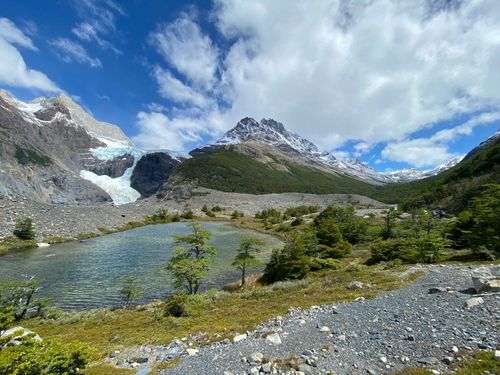
Cultural and Historical Treasures in Chile
The Rich Heritage of the Mapuche People
The Mapuche community is a vital part of Chile's cultural history. Some Mapuche communities and families open their houses and hearts to share their knowledge and lifestyle with travelers interested in learning about their history, their daily life, and their relationship with nature. They have become a great example of how indigenous groups can share their cultural heritage and conserve it at the same time. Discover more about the Mapuche community.
Unveiling the Mysteries of Easter Island's Moai
Easter Island must surely be one of the greatest mysteries of human civilization. Many theories have been formed over the years about where the original inhabitants came from, why they built hundreds of monumental statues called Moai, how they transported them, and why the people who made them eventually died out.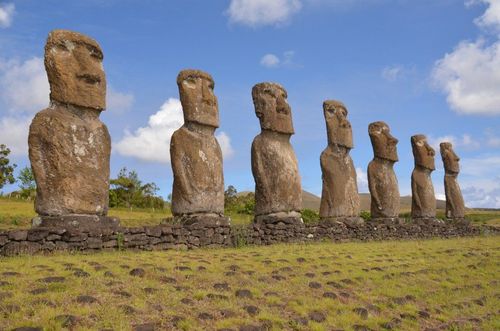
Colonial History and Architecture in Valparaiso
The colonial city of Valparaiso presents an excellent example of late 19th-century urban and architectural development in Latin America. The colonial city of Valparaiso is home to many colorful buildings, graffiti, soulful murals, and peculiar examples of street art. One can find breathtaking landscapes, exhausting hills or cerros, and a rich historic backdrop due to which it was registered as a UNESCO World Heritage site in 2003. Wandering around the city, one can experience brilliant and poetic chaos among the lanes and the people.
Vibrant Cities and Urban Experiences
Santiago: The Heartbeat of Chile
Santiago is the capital city of Chile and both its cultural and economic center. It has a great calendar of events and buzzes with theaters, restaurants, and bars. Situated in the middle of the country, it also provides a great base from which to explore the stunning landscapes of Chile. There are many places to visit in Santiago de Chile such as Plaza de Armas, Santuario del Cerro San Cristóbal, Jazz Clubs, and more. Discover more things to do in Santiago.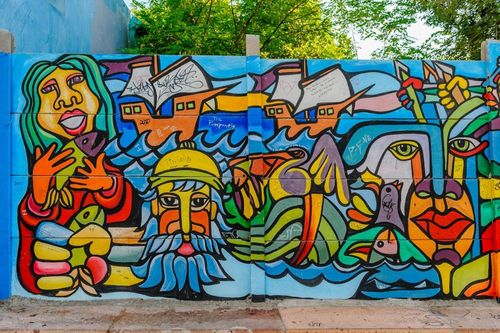
Valparaíso: A City of Color and Culture
Valparaiso is Chile's main port known for its bohemian, artistic vibe and lovely vistas. Its UNESCO-designated historic downtown offers charming colonial architecture, great seafood restaurants, markets, and stores. Take the 100-year-old funicular Ascensor Artilleria or climb Cerro Concepcion for stunning ocean and city views. Back at street level, visit writer Pablo Neruda's house.Puerto Varas: Gateway to the Chilean Lake District
Puerto Varas is one of the best places to base yourself to explore the Chilean Lake District. It has an enchanting setting, perched on the shores of Lake Llanquihue, and overlooked by not one but two stunning snow-capped volcanoes: Osorno, a perennially popular hiking destination, and Calbuco.
Outdoor Activities and Adventure Sports
If you love outdoor activities, the South America travel guide lists some of the best outdoor activities and sports adventures you can do on your trip to Chile.Hiking and Trekking in the Andes Mountains
These two outdoor activities are perfect for knowing the natural beauty of Chile’s Andes Mountains. There are many hiking trails you can choose but we recommend the Ascent to Cerro Toco-San Pedro de Atacama. It’s a 1-day adventure hiking a beautiful volcano for an ascent in Chile. Discover more hiking trails in the Chilean Andes.Skiing and Snowboarding in the Chilean Alps
For skiing and snowboarding lovers, the Andes Mountains are a good destination to have a Winter vacation. You’ll be able to admire the majestic mountains and the interesting culture and its rich history. The Chile ski season begins in mid-June and runs to October. However the best snow conditions in Chile are generally mid-July to early September, but the busy Chile holidays are during mid-July which are best to avoid. Discover skiing and snowboarding activities in Chile. 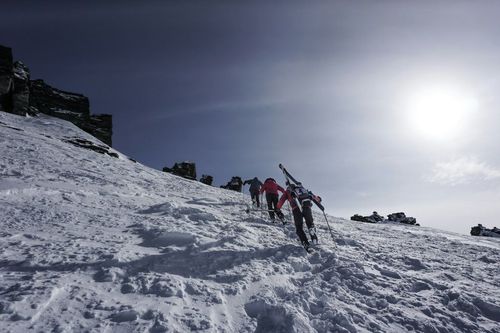
Surfing the Waves of Pichilemu
Located 126 kilometers to the Southwest of San Fernando, in the Region of the General Liberator Bernardo ÓHiggins, the beaches of Pichilemu are not only recognized by the beauty and tranquillity that offer to the visitors but also by the excellent conditions of wind and surf, that turn it into the best place for the practice of one of the most mystical aquatic sports ever: surfing. Discover more about Pichilemu.
Related: Chile Beaches: The Best Coastal Destinations
Chile's Traditional Cuisine
There is a large variety of typical dishes in Chile such as:Ajiaco (Meat soup): you can also find this plate in Bogota. The Chilean versión is generally done with the meat leftovers of a big barbecue. This tasty soup helps to mend the body or the hangover and to get one’s strength back, whether it is to go to work or to continue celebrating whatever has to be celebrated.
Caldillo de congrio (Conger eel soup): Pablo Neruda dedicated an ode to it that made it forever famous, especially in Isla Negra, where the poet lived. However, this soup is served all along the coast in Central Chile and even a little farther south of Talcahuano. Invigorating and not at all heavy, there is a variety of ways to prepare it, but it is always steaming hot and served in a clay dish, accompanied with mussels and clams in addition to a good white wine to honor it.
Chorillana: Born in the harbor of Valparaiso, this dish is made with French fries, finely cut onion, spicy sausage, beefsteak, and, crowning it all, one or two fried eggs. This cholesterol-rich meal is served on Saturdays and Sundays, very appropriate if afterward, you are planning to climb up one of the hills of Valparaiso.
Wine Tasting in the Valle de Colchagua
The Colchagua Valley is one of the most important in Chile for the production of high-quality wine farms. It has vineyards, wineries, farms, and hills that give way to the wine route. There are top places to go wine tasting such as Viña Montes and Viña Santa Cruz. Discover more wine-tasting tours in the Colchagua Valley.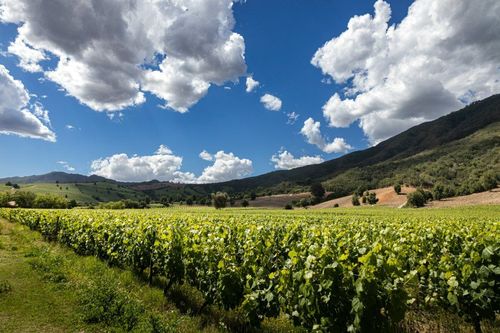
Explore Local Markets and Street Food
Beyond the interesting museums, fancy hotels, and impressive landscapes, there is a popular beauty in Chile’s local markets. Some cities like Santiago are home to a variety of traditional markets where you can buy food, street food like empanadas and sopaipillas, clothes, and souvenirs for a Budget pocket. Explore the local market to discover the true popular beauty of Chile!
Practical Travel Information
Best Time to Visit Chile
The best time to visit Chile depends on the region you’re traveling to. This ultimate South America travel guide recommended October to March as the warmest and most accessible months for visitors heading to Patagonia in the south of the country. Meanwhile, Santiago, the central valleys, and the Atacama Desert are year-round destinations. Hot weather (up to 30°C) draws the crowds in during the summer months of December to February, so it’s important to book well in advance. June to August are popular for skiers in the mountains around Santiago, although most other attractions are closed during this time. Temperatures sit between 15°C and 16°C.
Essential Packing List for Chile
The ultimate South America travel guide offers you a basic list of things you might need on your trip to Chile:- Universal Travel Adapter: Chile uses type C and L-type outlets, which have two or three round pins. Bringing a travel adapter is necessary to charge your electronic devices.
- Alternative Down Puffer Jacket: Chile has extremes in temperatures. Packing a puffer jacket can especially come in handy when traveling to the Patagonia region of the country.
- First Aid Kit: Accidents can happen no matter where you are but are especially common while traveling. If you plan to travel solo, it is vital to pack your first aid kit that has the basics to aid in any injury or sickness.
- Hiking Boots: Packing a pair of hiking boots is essential to traveling to Chile, as you never know when you might end up on an impromptu hiking trip
- Daypack: With such an abundant array of activities to do in the country, from city sightseeing to hiking, a daypack will keep all your stuff on you comfortably.
Stay Connected in Chile with Yoho Mobile
An important thing you won’t forget is to buy an eSIM to stay connected at any time and any place, without exposing your personal information connected to public WiFi. Yoho Mobile offers affordable eSIM data packages with easy and intuitive setup and 24/7 custom support. Yoho Mobile allows you to stay connected in Chile.
🎁 Special Discount for Our Readers!As a special treat for our readers, Yoho Mobile is offering an exclusive discount! Use our coupon code "YOHOREADERSAVE" to get your first order for FREE!Don’t miss out on this opportunity to stay connected affordably while exploring Chile. |
|
The Ultimate Argentina Travel Guide
Top Attractions in Argentina
These are the top attractions in Argentina recommended by the South America travel guide.Buenos Aires
The vibrant capital is known for its European architecture, tango shows, the historic districts of San Telmo, Palermo, and La Boca, and delicious Arn¡gentine steaks at neighborhood parrillas. Also, Buenos Aires is home to world-class opera, ballet, and symphonic music at the Teatro Colón, Museo de Arte Latinoamericano de Buenos Aires (MALBA), Museo de Arte Moderno de Buenos Aires (MAMBA) and the Museo de Bellas Artes hold some of the very best art from Latin America and the world.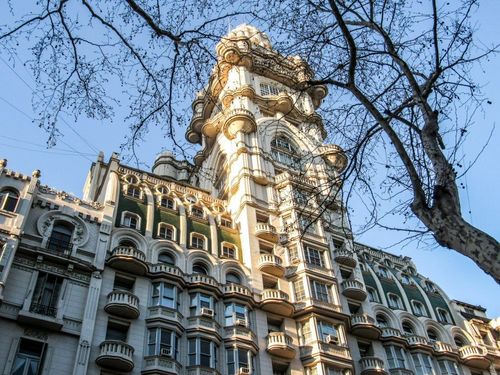
Iguazu Falls
One of the world's most stunning waterfalls, located on the border between Brazil and Argentina. The best way to experience the Argentine side of Iguazú Falls is by hiking the two main circuit trails. The Upper Circuit Trail offers panoramic views over Mbigua Falls and the Iguazú River. The Lower Circuit Trail has more viewpoints, and access to activities such as boat trips white-water rafting, and a free ferry to Isla San Martín.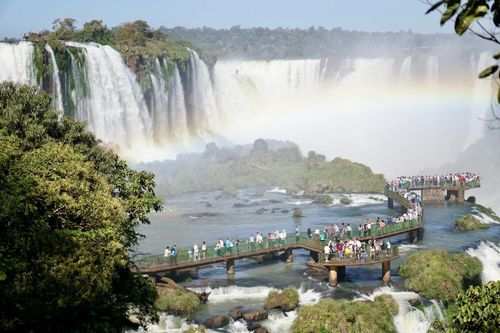
Patagonia
A vast region offering breathtaking landscapes, including the Perito Moreno Glacier, one of the few glaciers in the world that is still moving, and the Fitz Roy Mountain beloved by extreme challenge mountain climbers and photographers of the extreme beauty.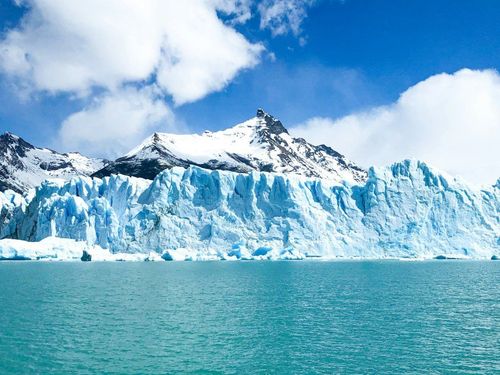
Mendoza
Renowned for its wine production, especially Malbec, and beautiful vineyards, this place is a must-visit destination for wine lovers. You’ll be able to go on vineyard excursions and savor top-notch Malbec wines. Remember to always book your wine-tasting excursions in advance.
Bariloche
Nestled in the Andes, this city is the ideal place for outdoor enthusiasts. It’s a picturesque town in the Lake District, perfect to enjoy skiing and hiking opportunities while admiring the scenic beauty of the lakes.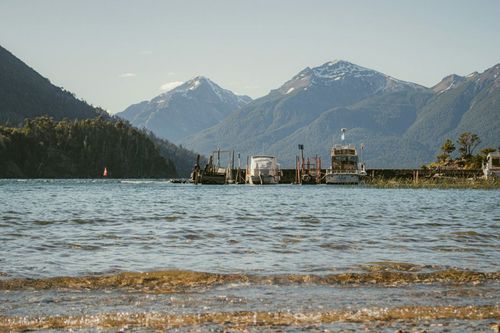
Best Time to Visit Argentina
Argentina can be visited year-round, but there are some places you need to visit in specific months to have the best experience. Patagonia (in the south of Argentina) is most accessible between December and March. The weather in Buenos Aires is generally hot over these months, but a visit in the cooler, crisp months of July and August can be delightful.Over spring (September to November), the Lake District comes alive with wildflowers. Meanwhile, autumn in the wine valleys surrounding Mendoza features gold and copper-colored vines, stark against the backdrop of the Andes.
Cultural Experiences in Argentina
In this South America travel guide, we list some of the most popular cultural experiences you must have in Argentina.The first thing you must do when arriving in Argentina is sip mate, an energizing tea made of the dried leaves of the yerba mate, a native South American plant. Mate is traditionally served in a hollowed-out gourd, sipped through a metallic straw known as a bombilla.
Dance or watching a tango show is another must-do activity to feel full of Argentinian culture. This seductive and dramatic dance is perhaps Argentina’s most famous cultural contribution to the world stage. If traveling in August you’ll enjoy the Tango Festival, a must-see event for tango lovers.

Finally but not less important, is the gaucho culture. It was born and bred in the Pampas as a unique mix of European and indigenous traditions. It best reveals itself in Argentinian cowboy towns like San Antonio de Areco, which hosts an annual gaucho festival each fall.
Related: 20 Interesting Facts About Argentina That Will Amaze You
Adventure Activities
Argentina’s Patagonia region is well-known for its natural beauty and outdoor adventures. The region is home to the stunning Torres del Paine National Park, which offers visitors a chance to hike through the Andes Mountains, witness the Perito Moreno Glacier, and spot wildlife such as guanacos and condors.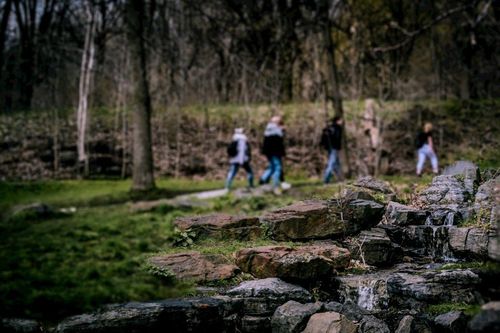
Gastronomy Guide
Argentina is a food lover’s paradise, and its cuisine is a reflection of the country’s rich cultural heritage. One of the best ways to taste Argentine cuisine is to visit local markets and food stalls. The South American travel guide recommends San Telmo Market as a popular destination for foodies because offers a wide range of Argentine snacks and traditional dishes.Argentina is also famous for its wine production, and Mendoza is the country’s premier wine region, along with its well-known Malbec wine. Some wine-tasting tours in Mendoza offer visitors the opportunity to explore the vineyards and learn about the wine production process.

Travel Tips and Essentials
Essential Packing List For Argentina
This South American travel guide lists a packing list to help you pack efficiently for your Argentina trip. Let’s start!- Documents and money: we talk about a Passport and a photocopy. Also, we recommend bringing dollars to exchange for pesos in Argentina.
- Versatile Clothes: Argentina is diverse in climate and geography. We suggest always having one pair of jeans, a nice outfit like a dress or a nice shirt you can combine with jeans, walking shoes and hiking boots.
- eSIM and other travel apps: Apps like WhatsApp and Google Translate will be your safe ticket. Don’t forget to download a map and buy an eSIM to stay connected at any place. The South America travel guide recommends buying an eSIM in Yoho Mobile.
- Universal Adaptor: Very important item you don’t want to forget. Argentina has two kinds of outlets: European (two round prongs) and Australian (two angled flat prongs)
Stay Connected in Argentina with Yoho Mobile
Make sure you can connect at any time and in any space in Argentina. An eSIM gives you these conveniences and more. Its management is very intuitive and easy to use. Yoho Mobile’s eSIMs are your best option, they have a wide variety of data packages to cover your travel needs. Don’t miss the opportunity to stay connected with us!
🎁 Special Discount for Our Readers!As a special treat for our readers, Yoho Mobile is offering an exclusive discount! Use our coupon code "YOHOREADERSAVE" to get your first order for FREE!Don’t miss out on this opportunity to stay connected affordably while exploring Argentina. |
|
